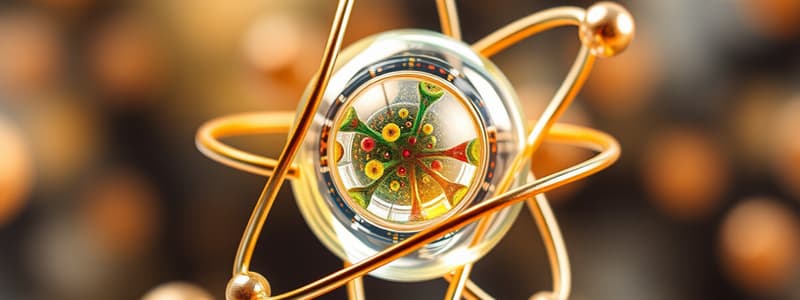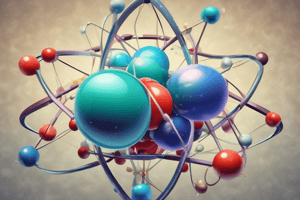Podcast
Questions and Answers
What term describes the interaction where like charges repel each other?
What term describes the interaction where like charges repel each other?
- Neutral
- Shell
- Attract
- Repel (correct)
What is the definition of attract?
What is the definition of attract?
Unlike charges
What is the definition of repel?
What is the definition of repel?
Like charges
What is the definition of neutral in terms of charge?
What is the definition of neutral in terms of charge?
What does the term shell refer to in atomic structure?
What does the term shell refer to in atomic structure?
What are nonmetals characterized by?
What are nonmetals characterized by?
What does periodicity refer to in chemistry?
What does periodicity refer to in chemistry?
Which family of elements is known as noble gases?
Which family of elements is known as noble gases?
What is the maximum number of electrons in a single 'd' subshell?
What is the maximum number of electrons in a single 'd' subshell?
The nuclear product of radioactive decay is called the daughter nuclide.
The nuclear product of radioactive decay is called the daughter nuclide.
What effect does the emission of a Beta particle have?
What effect does the emission of a Beta particle have?
A gamma ray emission results in the release of energy without any apparent change in mass or nuclear charge.
A gamma ray emission results in the release of energy without any apparent change in mass or nuclear charge.
The half-lives of unstable isotopes vary from milliseconds to billions of years.
The half-lives of unstable isotopes vary from milliseconds to billions of years.
The combining of atoms is known as nuclear fission.
The combining of atoms is known as nuclear fission.
Where does the energy come from in a fusion reaction?
Where does the energy come from in a fusion reaction?
Flashcards are hidden until you start studying
Study Notes
Key Vocabulary in Chemistry
- Attract: Describes the phenomenon where unlike charges pull towards each other.
- Repel: Refers to the interaction between like charges that push away from each other.
- Neutral: Indicates the charge of a neutron, which is neither positive nor negative.
- Shell: Represents the designated location of an electron within an atom.
- Nonmetals: Elements characterized by high ionization energies, implying they hold onto their electrons tightly.
- Periodicity: Describes the repeating patterns observed within atomic structures across the periodic table.
- Noble Gases: The group of elements recognized for their minimal reactivity, classified as the least reactive family of elements.
Electron Configuration
- Maximum of 10 electrons can occupy a single d subshell, crucial for understanding electron distribution in atoms.
Radioactive Decay
- True or False: The nuclear product of radioactive decay is termed the daughter nuclide.
- Emission of a Beta particle has specific effects, including no change in overall mass and the addition of a proton of insignificant mass to the nucleus.
Characteristics of Radiation
- True or False: Gamma ray emissions occur without observable changes in mass or nuclear charge.
- True or False: The half-lives of unstable isotopes can range dramatically from milliseconds to billions of years.
- True or False: Nuclear fusion represents the process of atoms combining to form a heavier element.
Energy in Fusion Reactions
- Energy in fusion reactions is produced from a small amount of gas that is converted to energy, highlighting the power potential in nuclear processes.
Studying That Suits You
Use AI to generate personalized quizzes and flashcards to suit your learning preferences.




